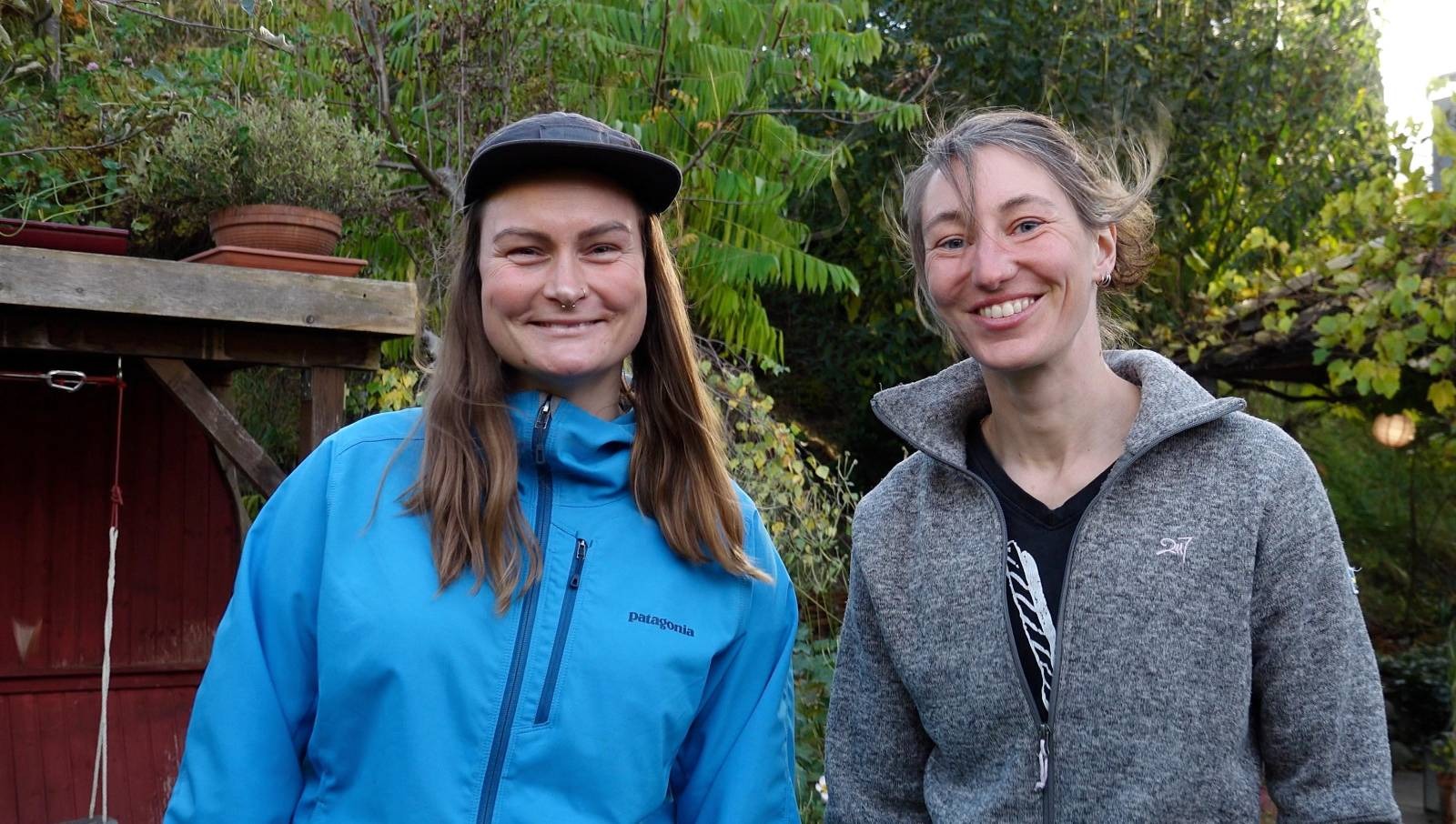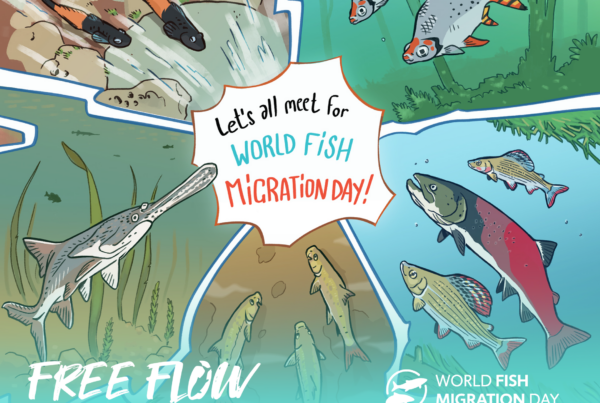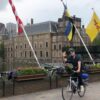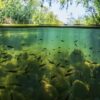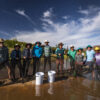WET– Wildwasser erhalten Tirol is an Austrian association committed to protecting rivers and streams in Tyrol. Originally rooted in the kayaking scene, WET aims to raise awareness about the threat of hydropower to Tyrolean riverine ecosystems. Hydropower is a huge issue in the region as the last free-flowing stretches of rivers are being dammed to generate electricity. WET organizes several initiatives to sensibilize the local community, ranging from protests to documentary screenings and petitions. At the moment, they are actively campaigning to stop the expansion of the Kaunertal plant and protect the last wild alpine streams in Austria for the common good. We interviewed Anne and Marieke to understand what is happening in Tyrol and to learn more about their conservation mission.
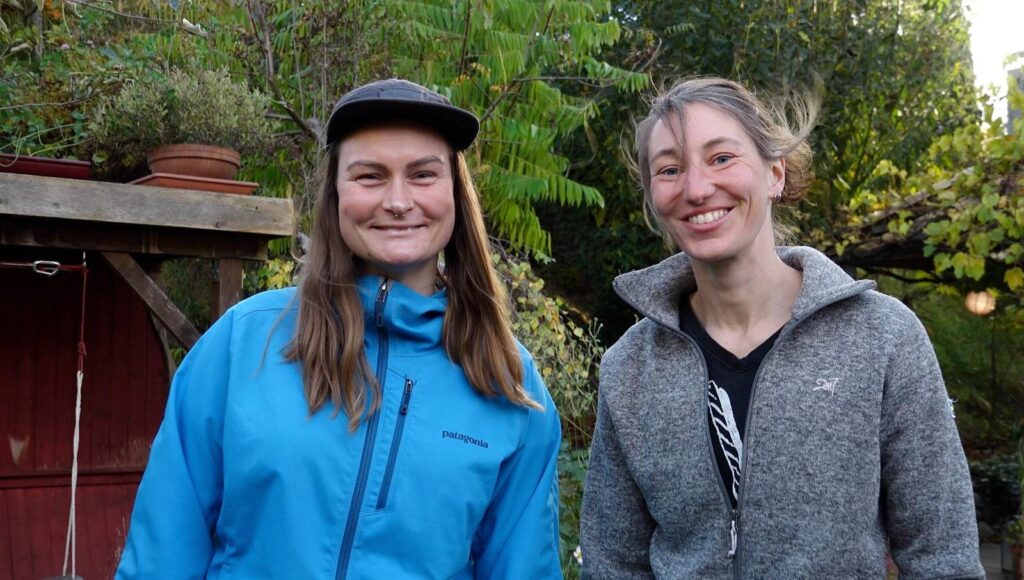
Anne (left) and Marieke (right) are running WET (© Harry Putz).
What is WET and how did it start?
[Marieke] WET – Wildwasser erhalten Tirol means “preserve Tyrol’s whitewater”. We are a small team of volunteers originally rooted in the whitewater kayaking scene. We founded WET in 2014 when a group of local kayakers was suddenly confronted with plans for a massive hydro scheme that was threatening their favourite river in the Stubai Valley. WET has been committed to the preservation of Tyrol’s rivers ever since.What is happening in the Ötztal Valley?
[Anne] The state-owned hydropower company Tiroler Wasserkraft AG (TIWAG) is planning to expand the existing storage hydropower plant in the Kaunertal by constructing 3 additional power plants. This expansion would flood one valley and dry out another valley.The plans involve constructing dams on the Venter and Gurgler Ache rivers and diverting up to 80% of their flow into the existing Gepatsch Reservoir Lake in Kaunertal. The diversion would deprive the Ötztaler Ache River of up to 80m³/s of its water. This would have enormous negative impacts on the water supply of the Ötztal Valley: the valley already receives little precipitation as an intra-alpine dry valley, and it is also losing water reservoirs from glaciers due to climate change.
If the expansion plans are approved, TIWAG would secure water rights for 90 years, leaving farmers, the local population, and tourism in the valley at a disadvantage. The ecological effects on the Venter, Gurgler, and Ötztaler Ache rivers would also be devastating.
Furthermore, a new reservoir lake is planned in the Platzertal, a high valley west of the Kaunertal. Their plan is to build a 120m high and approximately 450m wide dam for the new reservoir flooding the valley. This would result in the loss of large areas of high-alpine wetlands and moorland. It would effectively be the biggest planned destruction of moorland in Middle Europe.
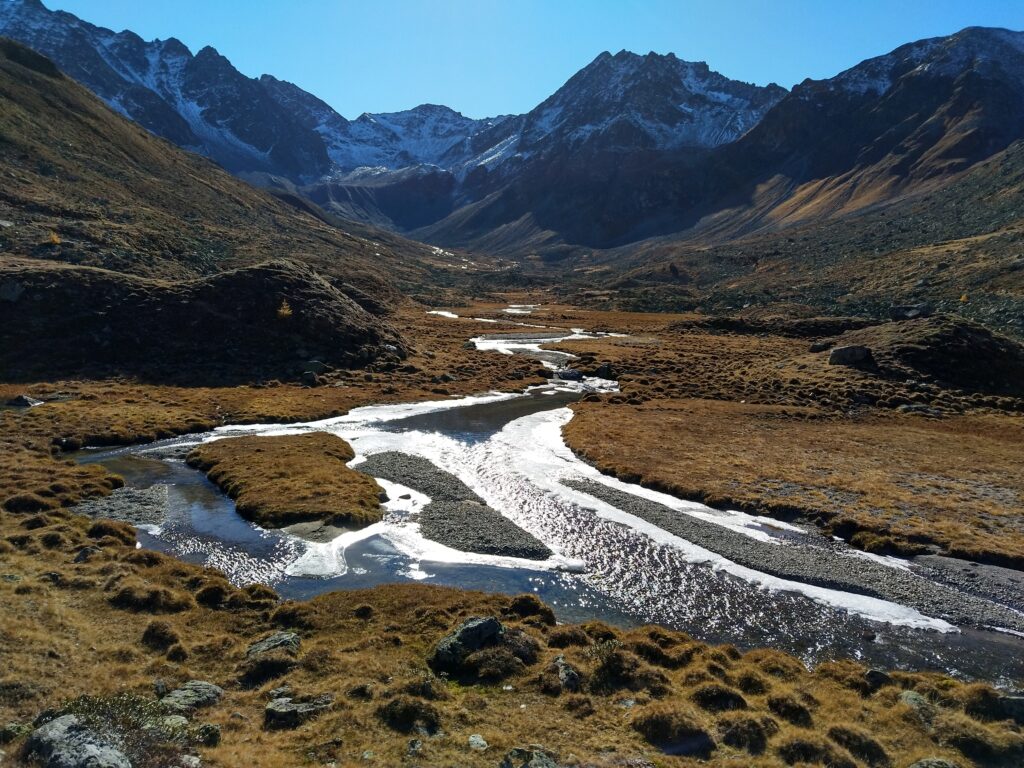
Platzertal is threatened by the construction of a 120m-high and 450m-wide dam
Why is it important that the Ötztaler Ache River and its tributaries remain free-flowing?
[Anne] The Ötztaler Ache River is the biggest (almost) free-flowing glacial river in Tyrol and the last glacial river of that size in Austria that has not been massively diverted. Its tributaries – the Venter Ache River and the Gurgler Ache River – receive most of their water from the large glaciers of the Ötztal Alps. Their deep and remote gorges are truly wild places, with only kayakers passing through them. All three rivers are home to rare and intact ecosystems that should be protected rather than destroyed.Diverting 80% of the water of the Venter and Gurgler Ache rivers out of the valley would also threaten water security in the Ötztal Valley, which is home to about 20,000 people and one of Tyrol’s most important tourist destinations. If the Kaunertal Expansion Project is approved, TIWAG will receive the water rights for practically all the available water of the upper valley for 90 years! In our opinion, water is too important to only be used for energy production. We need it as drinking water, irrigation, recreation and sports, tourism… and we need intact river ecosystems.
For the kayaking community, the diversions would mean losing “the Ötz” as a kayaking destination. The Ötz is not just any river, it is rather the Eiger North Face of kayaking – one of the most famous, widely-know rivers in the world, with infamously hard sections but at the same time so much variety to also be one of the most popular holiday destinations for kayakers. We’d not only lose one of our most important playgrounds, but also an important part of the kayaking culture.
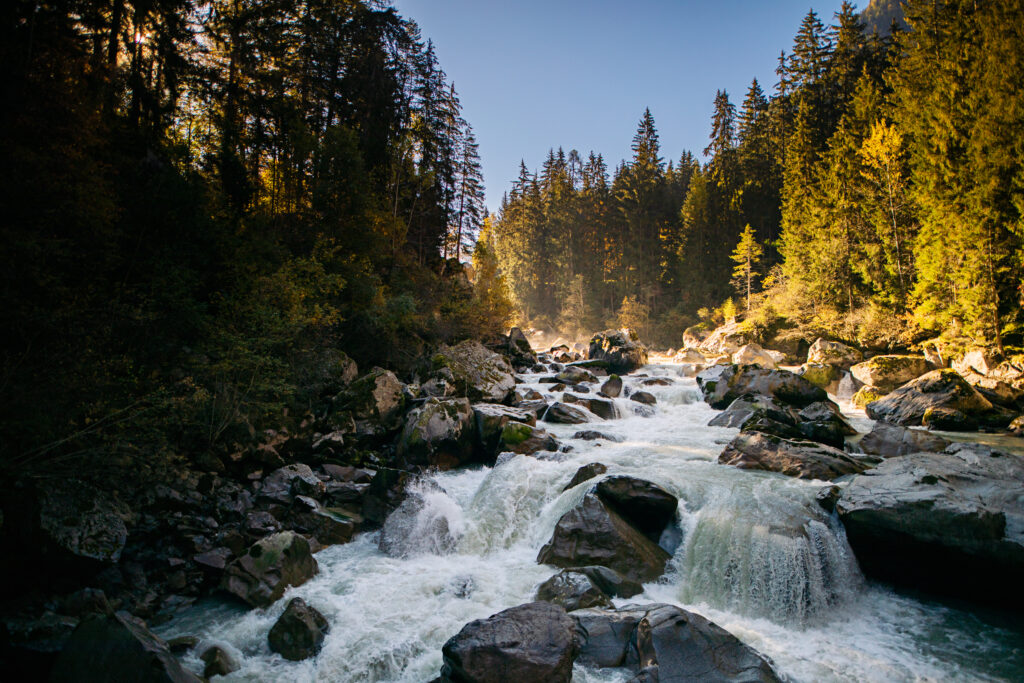
The Ötz is an all-time favourite for the kayaking community (© Katja Jemec).
How did the local community and kayakers react to the expansion of the Kaunertal hydropower plant?
[Marieke] TIWAG’s strategy for limiting opposition to the expansion project comprises two things: (1) publish as little as possible about the plans and (2) keep repeating that the project is “green energy” to produce electricity “for the Tyroleans” and that there is “no alternative” due to climate change.When we started campaigning about 3 years ago, almost nobody in Tyrol was aware of the project. When we tried to explain all the negative impacts, people were skeptical because they saw “no alternative”. That’s why we produced a documentary film – “Bis zum letzten Tropfen – Tirol und die Wasserkraft” (translated to Down To The Last Drop – Tyrol And Its Hydropower) – about the project and organized screenings all over Tyrol.
The film was a game-changer. Through the film, we managed to get a lot of media coverage in Tyrol and now the expansion project is more widely known. And more importantly, the locals in the affected valleys started to raise their voices, form new initiatives, and openly protest the project.
The kayakers’ reaction was different. A lot of kayakers are familiar with the threats of hydropower. These projects don’t only affect river ecosystems or the local water security, but also the kayakers’ playgrounds. So many understood immediately that “the Ötz” needed help.
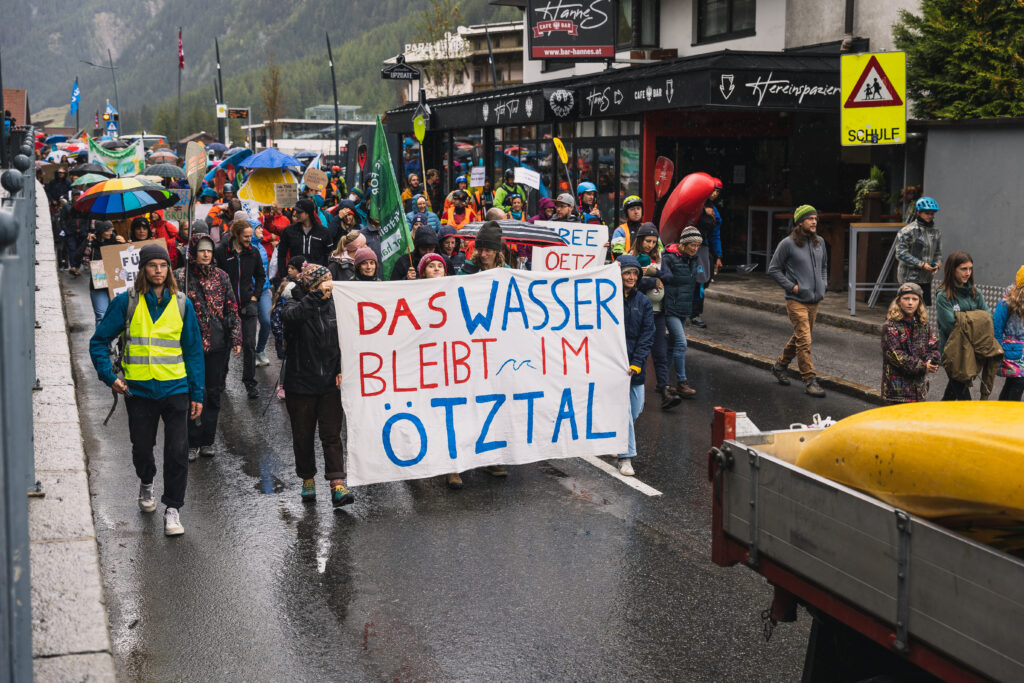
Kayakers and the local population opposing hydropower in Sölden (© Milos Jakobi)
Your documentary “Down To The Last Drop – Tyrol And Its Hydropower” investigates the role of hydropower in the energy transition. What lessons can be learned from the current situation in Tirol?
[Marieke] The climate crisis and the need for renewable energy makes it easy for hydro companies to sell their projects as “green” and “inevitable”. Our experience is that people know extremely little about rivers. They don’t know what a healthy river looks like, how much we depend on them, and how destructive hydro projects are.In Tyrol, we feel the summer heat increasing – more and more people are spending time by the rivers if they can. The valleys are becoming dryer, more water is needed for irrigation, and at the same time the existing wells are shrinking. We are already experiencing conflicts about “water for life” against “water for profit”. But the problem is that explaining all this to the affected communities is complex and takes a lot of time.
In our case, showing people the film did the trick and helped a lot with explaining the problem. But this still does not mean that we won the battle against hydropower, we still have a long way to go – in Tyrol as well as worldwide. I think we need better laws to protect rivers, and less corruption.
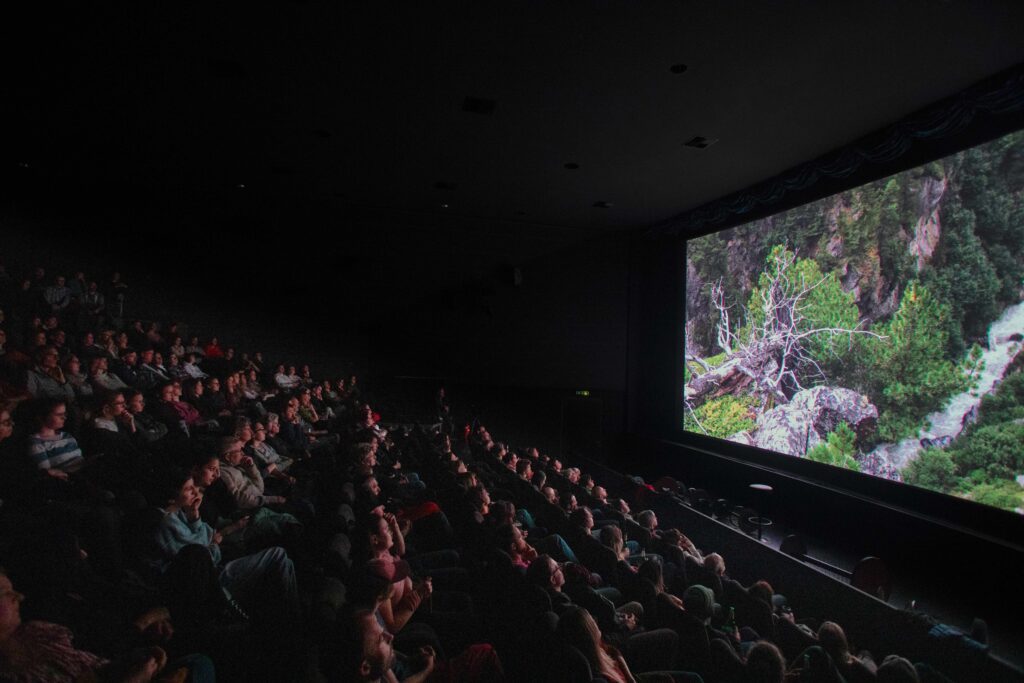
Premiere of ”Bis zum letzten Tropfen – Tirol und die Wasserkraft” documentary (© Stuart Knowles)
What are the next steps for WET? How can people get involved in your project?
[Anne] We need your support! These months leading up to October 2024 are crucial in fighting this project. TIWAG is currently revising the project application documents, which gives us time to act before the authorities may accept the application in October.WET is now focusing on strengthening the anti-Kaunertal movement in Tyrol, but we also need Europe-wide attention to put pressure on our local government. So please sign our petition to stop this project!
If you have channels to spread the petition (newsletters, social media, etc.), please help us with that. We also need international media contacts to spread the word and donations to cover our campaign cost. If you want to learn more about our mission, we have more information on our website wet-tirol.at (German and English).
Help us keep Tyrolean rivers free-flowing!
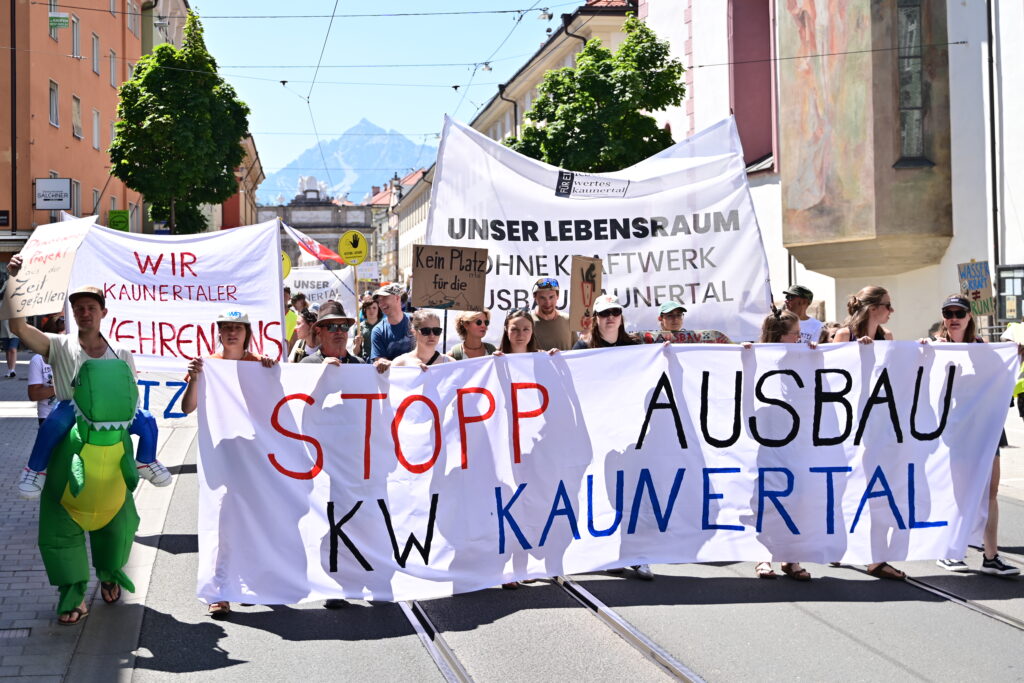
Protest against the Kaunertal expansion project in Innsbruck (© Maximilian Frey).
Read more Free Flow Champions and find inspiration for your World Fish Migration Day 2024 event.


